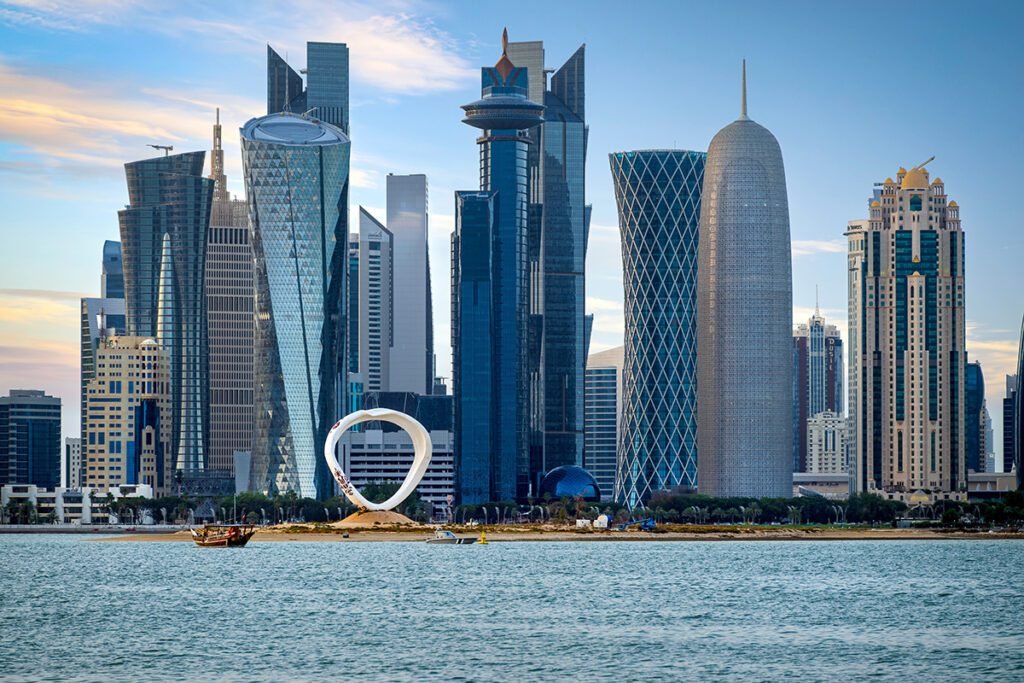DOHA, June 2025 — In a significant milestone for ethical finance, Qatar’s Islamic finance sector has reached a record-breaking $188 billion in assets. This monumental figure not only reflects the country’s commitment to Sharia-compliant financial principles but also positions Qatar as one of the leading Islamic finance hubs globally.
This achievement reflects more than just numbers—it embodies the resilience, innovation, and cultural alignment that continue to shape the nation’s economic future. With a clear focus on values-based finance, Qatar’s Islamic banking system is proving that financial growth and ethical frameworks can—and do—coexist.
A Historic Leap in Islamic Finance
Over the past decade, Qatar’s Islamic finance industry has evolved from a regional player to a globally recognized force. The latest surge to $188 billion in Islamic finance assets is the result of continuous expansion across banking, capital markets, insurance (takaful), and investment segments.

The nation’s Islamic financial assets now account for nearly 30% of its total banking assets, showing a strong national preference for Sharia-compliant financial solutions. This demand is being met by an ecosystem of dynamic institutions that blend tradition with technology.
Key Drivers of Qatar’s $188 Billion Boom
1. Government Support and Vision
Qatar’s government has laid a firm foundation for Islamic finance through favorable regulatory policies, robust governance frameworks, and strategic investments. The Qatar Central Bank (QCB) has played a central role in nurturing a sustainable ecosystem, setting clear guidelines for Sharia compliance while encouraging financial innovation.

Moreover, Qatar’s National Vision 2030—an ambitious blueprint for sustainable development—has been a guiding force. It emphasizes economic diversification, human development, and environmental sustainability—all principles well-aligned with Islamic finance.
2. Dominance of Islamic Banks
Islamic banks in Qatar, including Qatar Islamic Bank (QIB), Masraf Al Rayan, and Dukhan Bank, have significantly outpaced their conventional peers in recent years. These institutions have attracted investors and customers alike through offerings such as profit-sharing investment accounts, Sharia-compliant financing, and innovative Sukuk structures.
The strategic merger between Barwa Bank and the International Bank of Qatar, resulting in Dukhan Bank, also streamlined operations and expanded service delivery across key markets.
3. Booming Sukuk Market
One of the standout growth segments is the Sukuk market—Sharia-compliant bonds backed by tangible assets. Qatar has emerged as a leading Sukuk issuer in the region, with sovereign and quasi-sovereign entities frequently tapping into local and international demand.
Sukuk instruments have become a preferred funding method for large-scale infrastructure and energy projects, reflecting investor appetite for ethical and secure returns.
4. Technological Innovation and Fintech
Qatar’s Islamic finance sector has embraced digital transformation. Leading banks now offer mobile-first platforms, AI-powered customer service, and blockchain-based verification processes. These innovations have not only increased customer satisfaction but also lowered operating costs, making services more accessible to the public.
Islamic fintech is on the rise in Qatar, bridging the gap between ethical banking and Gen Z digital habits. Startups and banks are collaborating to offer robo-advisory tools, digital zakat calculators, and Islamic e-wallets.
Human Impact: More Than Just Financial Growth

Beyond balance sheets and profit margins, Islamic finance in Qatar has a deeply human face. It caters to communities seeking financial products that align with their values—such as avoiding interest (riba), uncertainty (gharar), and unethical investments.
Families are using Islamic mortgages to purchase homes. Small and medium-sized businesses are growing through Sharia-compliant loans. Startups are scaling with the help of Islamic venture funds. The impact is tangible, far-reaching, and culturally resonant.
Moreover, Islamic social finance tools like waqf (endowments) and zakat (obligatory almsgiving) are becoming more integrated into mainstream financial services, supporting education, healthcare, and poverty alleviation initiatives across the nation.
Qatar’s Role on the Global Islamic Finance Stage
While Malaysia, Saudi Arabia, and the UAE have long dominated the Islamic finance scene, Qatar is rapidly carving its own identity. With its $188 billion in assets, Qatar is now among the top five global players in the Sharia-compliant finance sector.
Qatari banks and financial institutions are expanding internationally, establishing branches and partnerships in Europe, Southeast Asia, and the wider MENA region. Sukuk issuances are being listed on global exchanges, and Qatar-based funds are investing in halal-certified businesses abroad.
This global integration not only enhances Qatar’s financial influence but also promotes the Islamic finance model as a credible alternative to conventional banking systems.
Strategic Roadmap: What’s Next?

Reaching $188 billion is a milestone, but Qatar’s financial leaders are already eyeing the next phase of growth. Several strategic initiatives are underway:
- Green and Sustainable Sukuk: Qatar plans to issue environmentally focused Sukuk to finance renewable energy projects, smart cities, and eco-friendly infrastructure.
- Islamic Fintech Sandbox: Regulatory authorities are working on a digital sandbox dedicated to Islamic fintech startups, encouraging innovation in areas like Islamic crowdfunding and AI-based Sharia compliance tools.
- Talent Development: With support from institutions like the Qatar Financial Centre and local universities, the country is training the next generation of Islamic finance professionals.
- Takaful Expansion: Islamic insurance is expected to grow significantly, with new products catering to health, family, and retirement planning in accordance with Islamic principles.
Challenges and the Road to Resilience
Despite the success, challenges remain. Regulatory harmonization with global standards, maintaining investor trust, and competing with interest-based offerings require continuous focus. However, Qatar’s proactive stance on governance and transparency has set it apart.
By reinforcing Sharia boards, auditing mechanisms, and risk management frameworks, the country is ensuring that growth does not compromise integrity.
A Symbol of Purposeful Prosperity
At its core, Islamic finance is about more than wealth. It is about purpose—financing that uplifts communities, supports real economic activity, and avoids speculation or exploitation.
Qatar’s Islamic finance boom is proof that prosperity and principle can walk hand in hand. As it crosses the $188 billion threshold, the nation stands not just richer, but more connected to its cultural, ethical, and spiritual roots.
The future looks bright—and most importantly, it looks fair.
Do follow UAE Stories on Instagram
Read More: UAE Central Bank Slaps $3.3 Million Fines on Six Exchange Houses












